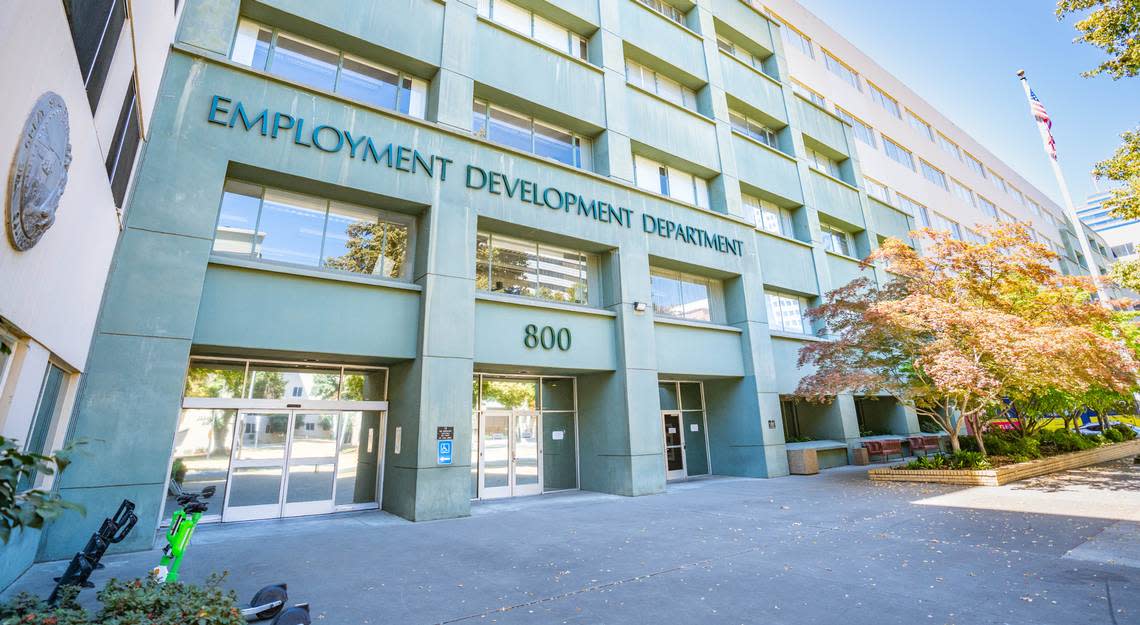Auditor slams California unemployment agency, calls it ‘high-risk’ due to pandemic-era fraud

The embattled California agency that provides employment services and unemployment insurance has been designated as a “high-risk” agency in a new report from the state auditor’s office.
The Employment Development Department’s mishandling of the state’s unemployment insurance program and its failure to issue accurate eligibility rulings poses a “substantial risk of serious detriment” to California and its residents, according to the Aug. 24 report. The department’s inability to estimate how much money was lost to fraud also significantly delayed state accounting reports for fiscal years 2019-20 and 2020-21.
As part of the high-risk audit program, the auditor’s office will conduct check-ins with EDD once every 18 months to evaluate whether the agency has made enough progress to be removed from the elevated designation.
California lost an estimated $20 billion in pandemic-era unemployment aid to fraudsters, which experts have said would be difficult to recover. Most of that money came from the now-ended federally-funded Pandemic Unemployment Assistance program, created just after the pandemic triggered an economic shutdown in March 2020.
Congress and President Donald Trump’s administration quickly created the PUA program and granted benefits to those who had traditionally not been eligible for unemployment insurance. However, the program did not include the same rigorous checks and balances typical of regular state programs, such as using employer-reported wage data to determine eligibility. Suddenly, independent contractors, small business owners and others could qualify while, at the same time, EDD was deluged with applications.
The unemployment agency pushed back on the auditor’s “high-risk” label, pointing to numerous efforts and changes that the department made to satisfy the auditor’s previous recommendations.
“The auditor’s risk scenarios in this high-risk report do not reflect the fraud prevention measures in place today and instead reflect outdated challenges that impacted the department at the height of the pandemic,” wrote the EDD in an official response to the auditor’s report.
Auditor says EDD’s improvements are ‘insufficient’
In addition to questioning EDD’s ability to quantify and recover fraudulent payments, the auditor criticized the department for having the third-highest reversal rate of unemployment eligibility decisions in the nation, as of March. From 2017 to 2022, about 50% of the issues that claimants appealed were ultimately overturned in favor of the claimant, which is consistent with the high rate of overturned decisions that the auditor pointed out in a different audit from nine years ago.
“These improper eligibility decisions can serve as unnecessary obstacles to claimants’ right to benefits and can result in a significant reduction in the overall effectiveness of the (unemployment insurance) program,” the report stated.
The auditor outlined how EDD is still lagging in its ability to provide timely customer service. The initial payment on an unemployment claim should be made within three weeks, according to the U.S. Department of Labor, and state departments should aim to pay 87% of those first payments on time. According to the report, EDD paid between 81% and 86% of those payments within three weeks of filing – just shy of the recommended threshold. The auditor also cited a figure that between January and May, individuals called EDD on average between three and eight times a week trying to get help with their claims.
The auditor’s report acknowledges that EDD deserves some credit for making progress in all of these issue areas since the height of the pandemic. Still, the auditor doesn’t view such progress as adequate.
“EDD’s current corrective action remains insufficient and is a contributing element to our designation of the agency as high‑risk,” the report said.
EDD says auditor’s claims rest on ‘outdated’ information
In the last three years, EDD contends that it partnered with ID.me, a commercial identity verification service, and Pondera, an investigation consulting firm by Thomson Reuters, to identify potential fraud cases early on. The department says those changes have prevented nearly $43.4 billion in fraudulent benefit payments from being issued.
Some of EDD’s fraud prevention measures, particularly the use of the Pondera firm, were scrutinized and criticized by a 2022 report from the Legislative Analyst’s Office.
That analysis said “the state’s use of these programs adversely impacted the experience of several hundred thousand unemployed workers with legitimate claims.” The LAO counseled the Legislature to reject future contracts with Pondera and advised that EDD scale back its anti-fraud efforts. The office added that such high levels of security are “not likely to be useful now that automated identity verification is in place.”
EDD also pushed back against the claims that the department’s decisions are frequently overturned by the California Unemployment Insurance Appeals Board. The department disagreed with the auditor’s definition of the word “overturned.”
“For example, if a claimant has an overpayment penalty reduced by the board, this is counted as ‘overturned’ even if the EDDs decision of ineligibility is affirmed,” the department wrote in its official response to the report. “EDD does not believe this accurately reflects the integrity of its eligibility decisions.”
The department also touted its improved customer service statistics. Between early June and mid-July this year, the average customer waited about 12.5 minutes to speak with an agent — a 64% improvement in response time from the pandemic, according to EDD’s official response.
“To further fortify the positive trajectory in customer service, the EDD has created a Customer Experience and User Experience team to conduct customer research and collect input to guide improvements,” wrote Aubrey Henry, chief of media services at EDD, in an email statement to The Bee. That team will also guide the development of the ongoing multi-year modernization project known as EDDNext. The effort will overhaul different parts of EDD’s benefits program, including the application and call center operations.
